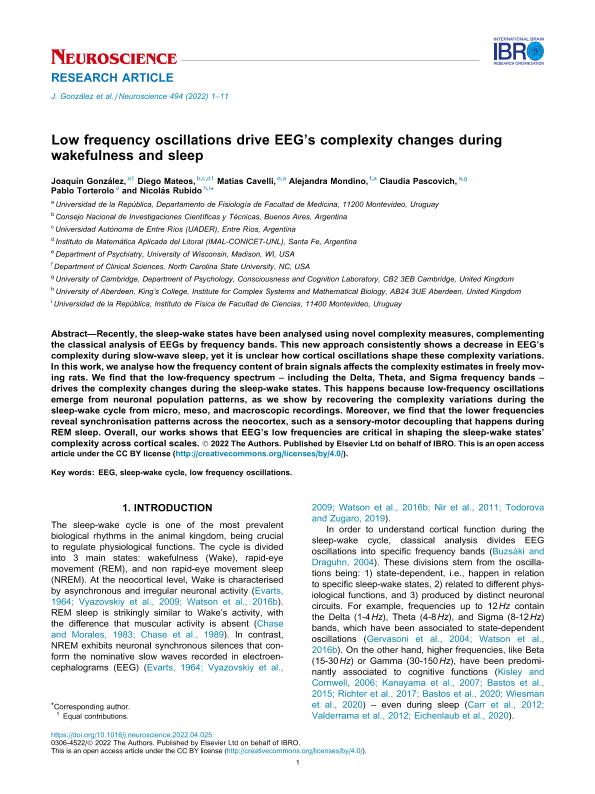Mostrar el registro sencillo del ítem
dc.contributor.author
González, Joaquín
dc.contributor.author
Mateos, Diego Martín

dc.contributor.author
Cavelli, Matias
dc.contributor.author
Mondino, Alejandra
dc.contributor.author
Pascovich, Claudia
dc.contributor.author
Torterolo, Pablo
dc.contributor.author
Rubido, Nicolás
dc.date.available
2023-08-03T12:15:19Z
dc.date.issued
2022-07
dc.identifier.citation
González, Joaquín; Mateos, Diego Martín; Cavelli, Matias; Mondino, Alejandra; Pascovich, Claudia; et al.; Low frequency oscillations drive EEG's complexity changes during wakefulness and sleep; Pergamon-Elsevier Science Ltd; Neuroscience; 494; 7-2022; 1-11
dc.identifier.issn
0306-4522
dc.identifier.uri
http://hdl.handle.net/11336/206712
dc.description.abstract
Recently, the sleep-wake states have been analysed using novel complexity measures, complementing the classical analysis of EEGs by frequency bands. This new approach consistently shows a decrease in EEG's complexity during slow-wave sleep, yet it is unclear how cortical oscillations shape these complexity variations. In this work, we analyse how the frequency content of brain signals affects the complexity estimates in freely moving rats. We find that the low-frequency spectrum – including the Delta, Theta, and Sigma frequency bands – drives the complexity changes during the sleep-wake states. This happens because low-frequency oscillations emerge from neuronal population patterns, as we show by recovering the complexity variations during the sleep-wake cycle from micro, meso, and macroscopic recordings. Moreover, we find that the lower frequencies reveal synchronisation patterns across the neocortex, such as a sensory-motor decoupling that happens during REM sleep. Overall, our works shows that EEG's low frequencies are critical in shaping the sleep-wake states’ complexity across cortical scales.
dc.format
application/pdf
dc.language.iso
eng
dc.publisher
Pergamon-Elsevier Science Ltd

dc.rights
info:eu-repo/semantics/openAccess
dc.rights.uri
https://creativecommons.org/licenses/by/2.5/ar/
dc.subject
EEG
dc.subject
LOW FREQUENCY OSCILLATIONS
dc.subject
SLEEP-WAKE CYCLE
dc.subject.classification
Neurociencias

dc.subject.classification
Medicina Básica

dc.subject.classification
CIENCIAS MÉDICAS Y DE LA SALUD

dc.title
Low frequency oscillations drive EEG's complexity changes during wakefulness and sleep
dc.type
info:eu-repo/semantics/article
dc.type
info:ar-repo/semantics/artículo
dc.type
info:eu-repo/semantics/publishedVersion
dc.date.updated
2023-08-02T17:53:05Z
dc.journal.volume
494
dc.journal.pagination
1-11
dc.journal.pais
Estados Unidos

dc.description.fil
Fil: González, Joaquín. Universidad de la República; Uruguay
dc.description.fil
Fil: Mateos, Diego Martín. Universidad Nacional de Entre Ríos; Argentina. Consejo Nacional de Investigaciones Científicas y Técnicas. Centro Científico Tecnológico Conicet - Santa Fe. Instituto de Matemática Aplicada del Litoral. Universidad Nacional del Litoral. Instituto de Matemática Aplicada del Litoral; Argentina
dc.description.fil
Fil: Cavelli, Matias. University of Wisconsin; Estados Unidos
dc.description.fil
Fil: Mondino, Alejandra. North Carolina State University; Estados Unidos
dc.description.fil
Fil: Pascovich, Claudia. University of Cambridge; Estados Unidos
dc.description.fil
Fil: Torterolo, Pablo. Universidad de la República; Uruguay
dc.description.fil
Fil: Rubido, Nicolás. Universidad de la República; Uruguay. University of Aberdeen; Reino Unido
dc.journal.title
Neuroscience

dc.relation.alternativeid
info:eu-repo/semantics/altIdentifier/doi/http://dx.doi.org/10.1016/j.neuroscience.2022.04.025
Archivos asociados
